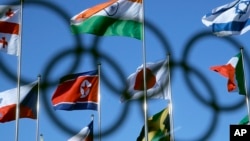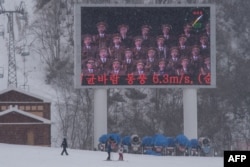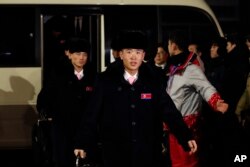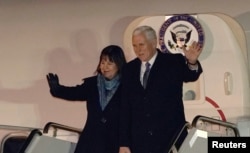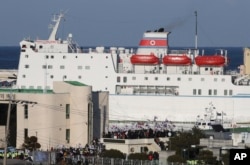With just days before the opening ceremony for the 2018 PyeongChang Winter Olympics, some U.S. experts are voicing concern that the highly publicized inter-Korean sports exchanges could undermine international sanctions intended to tighten the flow of cash into North Korea and pressure it to renounce its nuclear weapons and missiles programs.
Experts voiced their unease to VOA's Korean Service over the joint Korean ski training exercises held January 31 in North Korea's Masikryong Ski Resort, which was built with — and is operated using — equipment considered "luxury goods" prohibited under U.N. sanctions because skiing is a non-essential activity.
"I think they are walking a very fine line on the spirit of sanctions," said William Newcomb, a former U.S. Treasury official who served as a member of the U.N. Security Expert Panel on North Korea.
According to Joshua Stanton, a Washington-based attorney who helped draft the North Korea Sanctions Enforcement Act for the House Foreign Affairs Committee, some of the resort's equipment such as snowmobiles and ski lifts, while necessary for daily operations, could be considered in violation of sanctions imposed against North Korea.
"There [is] something maybe bigger than the spirit of sanctions here. ... Resolution 1718 prohibits North Korea from importing luxury goods, and clearly Masikryong would not run without luxury goods that were imported in violation of what the sanctions clearly intended," Stanton said.
Masikryong, opened in 2013, was built with Australian-manufactured equipment supplied by Chinese companies, which claimed that the equipment cannot be considered luxury items because skiing is a "normal activity" in North Korea.
Anthony Ruggiero, a senior fellow at the Foundation for Defense of Democracies, thinks the decision to hold the joint ski exercises was wrong in that it legitimized North Korea's defiance of U.N. sanctions.
The decision by the administration of South Korea's President Moon Jae-in "to participate in a joint training exercise at North Korea's luxury ski resort [was] a mistake," he said. "North Korea violated the U.N. luxury goods ban in place since 2006, and the joint exercise is a bad look for all involved."
Footing the bill
The concern is exacerbated by South Korea's plan to pay costs incurred by North Korea's Olympic delegation, which includes athletes, officials, journalists, a cheerleading squad dubbed the "army of beauties," and taekwondo practitioners slated to demonstrate the Korean martial art.
Choi Moon-soon, the governor of the host city, said the money for North Korea's stay should come from the Inter-Korean Cooperation Fund, a South Korean effort to facilitate cooperation. Although the fund is legal and monies will not flow into North Korea, questions have been raised over whether South Korea should cover the cost of Pyongyang's delegation.
William Brown, a professor of North Korean studies at Georgetown University, believes North Korea should pay its own way.
"I don't really see why South Korea needs to pay for all those groups of cheerleaders and other large groups of North Koreans. If they're going to come, I think they should pay their own way," Brown said.
U.S. strategy
Worries over the possibility that inter-Korean sports activities are undercutting the international sanctions efforts come at a time when the U.S. seeks to intensify the strategy of "maximum pressure" against North Korea to compel it to give up its nuclear weapons and missiles.
Vice President Mike Pence left Monday on a trip that culminates in a visit to Pyeongchang as the chief U.S. delegate to the games, which begin Friday. Pence plans to counter North Korea's attempt to use the Olympics as a propaganda venue to bolster its international standing while, as some analysts observe, driving a wedge between the U.S.-South Korean alliance.
"We've seen charm offensives by the North before, and they have not ever led to any sincere movement toward denuclearization," said a White House official. The U.S. will not "allow the North Korean regime to hijack the messaging with their propaganda."
Pence has left open the possibility for a meeting with a North Korean delegation at the Olympics. "With regard to any interaction with the North Korean delegation, I have not requested a meeting." But, he continued, "we'll see what happens."
Washington's and Seoul's approaches toward Kim Jong Un's regime have diverged slightly as South Korea has prepared for North Korea's participation in the Olympics. President Donald Trump has been seeking to intensify pressure through sanctions backed by military force, while Moon believes pressure must be accompanied by diplomatic engagement.
South Korea's efforts
After North Korea confirmed that it was sending a delegation to the opening ceremony led by Kim Yong Nam, the regime's ceremonial head of state and the most senior North Korean official, South Korea's Blue House Spokesperson Kim Eui-kyeom said Kim's visit "shows North Korea's seriousness in seeking to improve inter-Korean relations." The Blue House is equivalent to the White House in the U.S.
South Korea's Unification Ministry Spokesperson Baik Tae-hyun said that South Korea plans to hold an inter-Korean dialogue after the ceremony.
North Korea's contingent arrived Tuesday at Mukjo pot in Donghae, South Korea, via the ship Mangyongbong-92. The ship's first visit to South Korea in 16 years came about after Seoul temporarily lifted some bilateral sanctions.
South Korea banned North Korean ships from entering its ports in 2010 after 46 sailors died aboard a warship, an act that Seoul blamed on a North Korean torpedo attack.
Christy Lee contributed to this report which originated on VOA's Korean Service.




